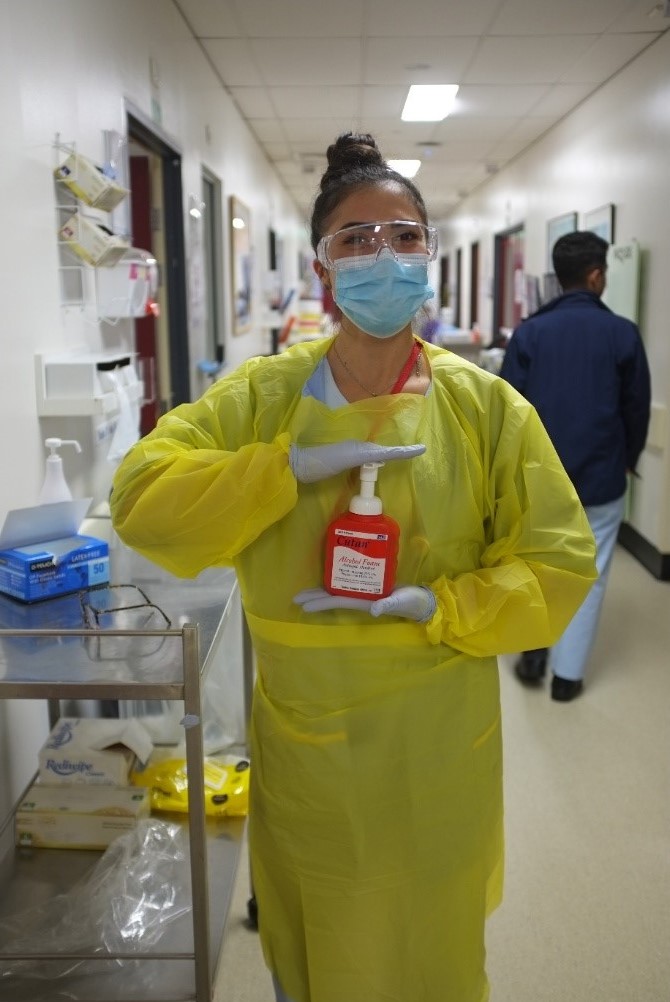Infection Prevention and Control Team
How we can help you
An infection is a disease caused by micro-organisms such as bacteria, viruses, fungi or parasites. People admitted to hospital are at risk of picking up different types of infection including wound, bloodstream, urinary track and chest infections. If you are unwell, have had surgery or are on certain medications you may have an increased risk.
Our Infection Control and Prevention team works closely with our Infectious Diseases Department, healthcare staff and patients to limit the spread of infection in our Hospital and the community.
We provide education to staff, patients and visitors on how to reduce their risks of developing or transmitting an infection. We also undertake surveillance activities, staff immunisation and promote the latest infection prevention practices.
1. Ask your health team questions about:
- Whether they have washed their hands. Staff should always wash their hands in front of you. If you did not see them you can remind them.
- Preventing infection in any tubes you may have had inserted such as a cannula (thin tube in a blood vessel) or catheter (tube inserted into your bladder).
- How to prepare your skin for surgery to reduce your risk of infection.
- Preventing infection in any wounds you may have from injury or surgery.
2. Wash your hands
 Even if your hands look clean they can still be carrying germs. It is very important that you wash your hands regularly with the alcohol rub or soap and water and particularly:
Even if your hands look clean they can still be carrying germs. It is very important that you wash your hands regularly with the alcohol rub or soap and water and particularly:
- Before you eat
- Before touching your eyes, nose, or mouth
- Before and after changing wound dressings or bandages
- After using the toilet, bedpan or bottle
- After blowing your nose, coughing, or sneezing
- After touching hospital surfaces such as bed rails, bedside tables, doorknobs, remote controls, or the phone
Picture: Nurse holding alcohol hand rub.
3. Inform your visitors
Ask your visitors not to come into our Hospital if they are sick. All visitors must wash their hands with the alcohol run or soap and water before visiting you and when they leave.
4. Follow our instructions about isolation
If a patient has an infection that can be spread to others or an infection resistant to antibiotics they may need to be isolated with additional precautions while they are in hospital. Our staff will guide you and your visitors on what actions you need to take.
5. Know about the signs of infection
Some skin infections appear as redness, pain or moisture around a wound or where a tube is entering your body. You may also have a fever. Tell your health team if you have any of these symptoms.
Tell your health team if you have diarrhoea three or more times in 24 hours, especially if you are taking an antibiotic.
6. Get vaccinated
Visit your GP to get vaccinated against flu and other infections. Vaccine protect you and others.
Learn more about infections that are resistant to antibiotics in these fact sheets:
- Antibiotic Resistant Bacteria
- Methicillin Resistant Staphylococcus Aureus (MRSA)
- Vancomycin Resistant Enterococcus
- Carbapenemase-producing Enterobacterales
Learn more about caring for the tubes you may have had inserted in your body in these fact sheets:
- Caring for your cannula - a small tube inserted in a blood vessel
- Caring for your Peripherally Inserted Central Catheter (PICC) - a long tube inserted into your vein
- Caring for your Central Venous Access device - a device inserted into a vein and end just above your heart
If you have any questions, please email us at SESLHD-POWH-InfectionPreventionControl@health.nsw.gov.au
